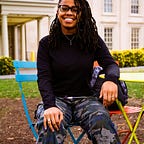True Allyship is Without Borders
I often wonder how accessible the world will be in 2040, fifty years after the passing of the Americans with Disabilities Act. Will the cries of mothers in waiting rooms force the government’s hand in free healthcare? Can we expect to see more education showcasing Disability history and culture? Or will the burdened souls of our community continue to exhaust all our resources for little to no aid? Disabled advocates have spent their lives fighting for equal rights and liberties for our community. We assemble organizations and committees that strive to see Disabled people thrive within society. But we fall short when we stop there. Disability justice falls on the shoulders of the same marginalized group asking for reform. The weight of a revolution should never lay on the shoulders of the marginalized. This is a collective journey, a journey that should be shared. We need our non-Disabled friends, family, and peers to join us on this journey. But what does that look like when put into action?
Over the last seventy years, social justice movements have become more widely accepted. America’s current climate may not be ideal, but its given birth to the next generation of activists and social justice leaders. For instance, the #MeToo movement has allowed countless Sexual Assault victims the freedom and support to stand in their truth. Movements such as the LGBTQIA2S+ movement, climate change, or the Black lives matter movement all have one idea in mind: equity and reform to all affected. As Disabled people, we are owed the same level of respect and equity. It seems to mimic the struggle of other marginalized groups; our voices become muffled under the guise of “allyship.” Which proposes the question of what does Allyship look like for Disabled people? Though this answer will differ for each individual, a common theme remains; granting Disabled people the security to body autonomy and accessible spaces.
When Disabled people become prominent or vocal about their needs, society tends to shy away from offering fair treatment. As long as we continue to act in the confines of what they find palatable. If we escape the small box society desires to place us in, then our need for empathy and reason begins to slowly evaporate. When we remain quiet about the unfair treatment we receive it is easier to deter us into submission. It’s easier to ignore the reality of the marginalized than assist when your life gets to remain unaffected.
Ignoring another's experience to prioritize your own false reality is a poor case of a judgment. It only solidifies the notion that marginalized groups are not gifted the same human decency as others. As a Disabled person, seeing the world constantly ignore our needs is infuriating. The world attempts to discredit or disqualify your experience if it isn’t aligning with their idea of Disability. For example, when Autistic patrons witnessed the monstrosity that was Sia’s movie “Music,” many allies ran to defend Sia. Expressing that it was a film to “support and uplift” the autistic community in a positive way. Though many advocates expressed the very deeply harmful scenes in the film, it was still ignored and mass-produced. Folks claim to be allies and advocates yet never adhere to the needs of the community affected. Honestly, I am an advocate mostly out of necessity. I enjoy educating others but the amount of burnout and emotional labor it takes is exhausting.
Which begs the question, how can non-Disabled people become better allies? How can their commitment to bettering themselves truly make strides for the Disabled community? This is where education and culture play a huge role. If students were given the opportunity to learn about Disabled people throughout history, maybe society would be more inclined to take part in dismantling the ableist systems in place. I’m aware that “people who mean well,” may not be actively trying to harm but your support is not helpful. Yes I know people need to learn from mistakes but harmful comments, decisions, and stereotypes, can cause a lot of damage due to one’s lack of awareness. To bridge the gap between the non-Disabled and the Disabled communities, we need folks to actively listen and explore their false narratives about Disability and illness.
